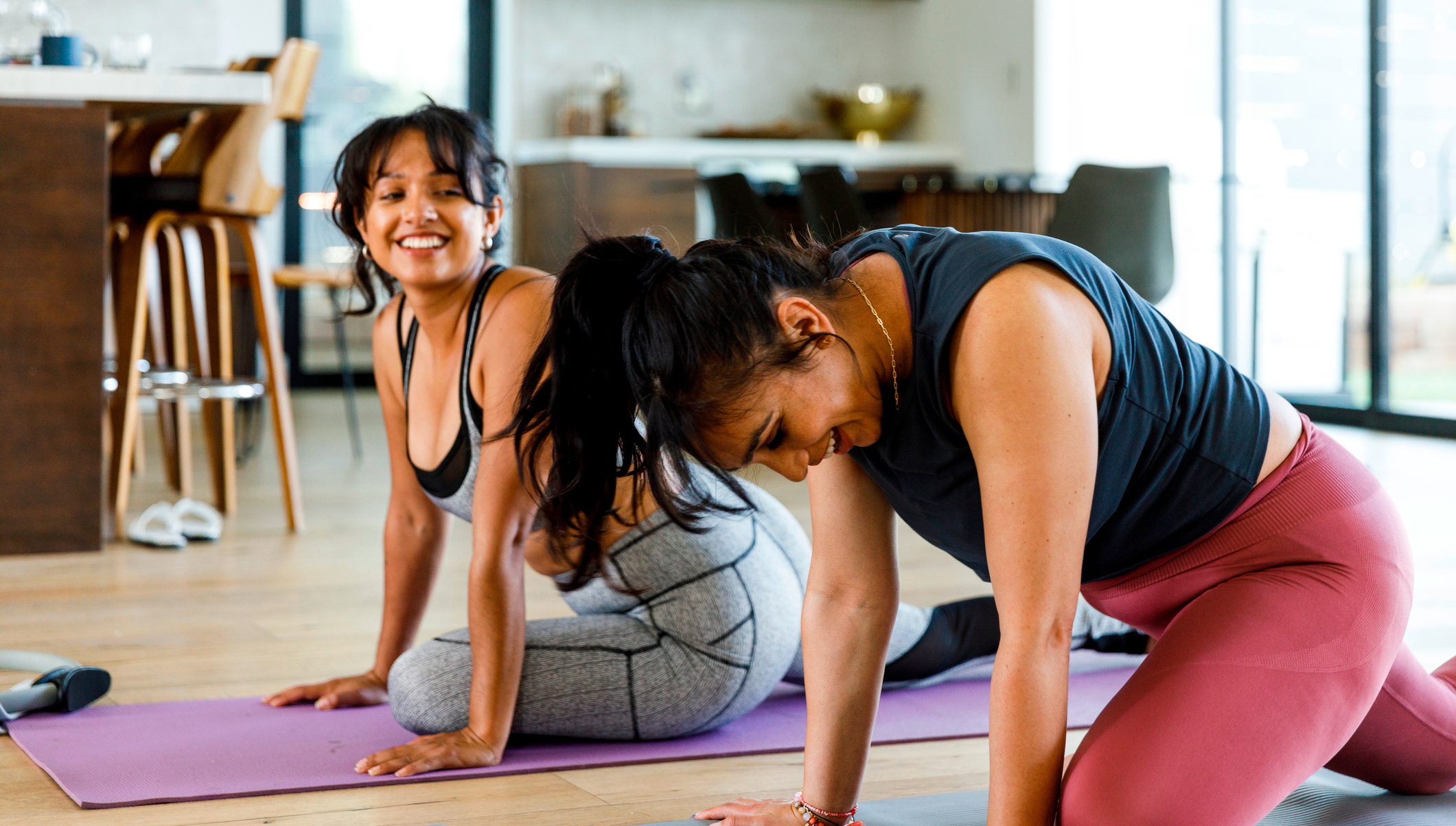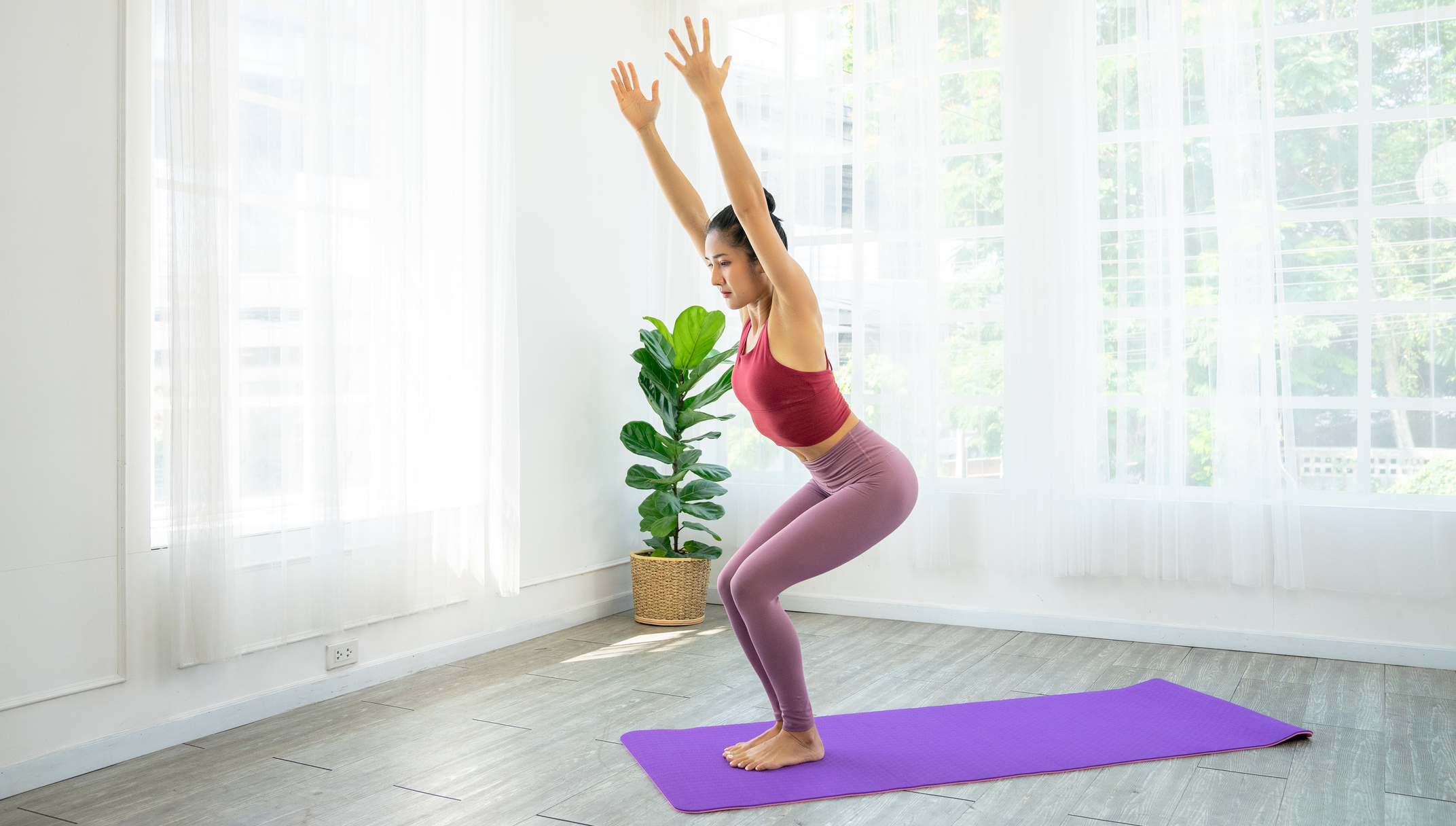You don't need weights to build strength and endurance, just this five-pose power yoga sequence
Get stronger in body and mind with these yoga poses from a YogaSix instructor

Yoga is often seen as a gentle, tranquil discipline that's more about relaxation than building strength. A power yoga session, however, can be every bit as physically challenging as a gym workout.
Power yoga builds strength, endurance and flexibility, making it a full-body workout. Think dynamic movements and balances that take focus and control, leaving you feeling energized and empowered.
Nicole Wood, master trainer at YogaSix has shared five power yoga poses that will fire up your muscles, raise your heart rate, and provide a mental and physical challenge. "There are many poses that build strength and endurance," says Wood. "Any time dynamic movement is added to a pose it is a sure way to build heat and to accelerate the heart rate."
1. Hovering tabletop
5 breaths
- Start on all fours, with a neutral spine, your hands under your shoulders and your knees under your hips.
- Tuck your toes under, take a deep breath and engage your core as you lift your knees an inch off the mat.
- Hold here for five breathes
"Hovering tabletop is super flavorful," says Wood. "The entire body is activated. It's challenging for the arms, shoulders, back, legs and core. You're working against gravity and are required to balance on your hands and tiptoes while maintaining a neutral spine from crown to tail."
2. Chaturanga flow
Video credit: pidjoe / Getty Images
3 rounds
Start your week with achievable workout ideas, health tips and wellbeing advice in your inbox.
- Start in a high plank position, with your hands slightly wider than shoulder-width apart and arms extended.
- Exhale as you bend your elbows to lower slowly, keeping your body in a straight line. Keep your elbows tucked into your sides, your forearms vertical and your shoulders should finish at the same height as your elbows.
- Inhale as you extend your arms, lift your chest into upward facing-dog and transition from your toes to the tops of your feet. Your thighs should stay off the mat.
- Exhale as you push back onto your toes and raise your hips into downward-facing dog.
- Inhale and return to high plank.
"In the chaturanga flow students are moving with their breath from a high plank to a hovering low plank, then taking a backbend into upward facing dog with their thighs floating off of the mat, and then pushing back into down dog," says Wood. "This is a common transition in vinyasa yoga classes. All muscles are needed. Because multiple poses are involved in the chaturanga flow the breath will be activated here as well."
3. Chair pose with open-arm twist

3 twists on each side
- Stand with your feet together. Bend your knees and push your hips back as if you were sitting down. Lean your torso forward slightly, keeping your back flat and your weight in your heels.
- Extend your arms to the sides.
- Keeping your hips and knees facing forward, twist from your midsection to the left, reaching your left arm and gaze toward the back of the room and reaching your right arm to the front of the room.
- Come back to the center and then repeat on the other side.
"Adding dynamic movement such as open-arm twists to chair pose is a sure way to build heat and accelerate the heart rate," says Wood. "Chair pose will burn the quads, activate the core and strengthen the shoulders. Want a bigger challenge? Lift the heels to light up the calves and challenge your balance."
4. Warrior 3
Video credit: Roman Vesely / Creatas Video+ / Getty Images Plus
5 breaths each side
- Begin in a split stance with your right foot forward, your right knee bent and directly above your foot, and your hands on your hips.
- Lean forward, shifting your weight entirely into your right foot, letting your left foot rise off the floor.
- Straighten your right supporting leg and continue lowering your torso while lifting your left leg, until your left leg and torso are parallel to the mat.
- Extend your arms forward with your palms facing.
- Keep your hips level and flex your left foot so your toes point to the floor.
- Take five breaths, then return to standing under control.
- Repeat on the other side.
"Warrior 3 is a balancing pose," says Wood. "It strengthens the balancing leg, and activates the glutes, core and back. Reaching the arms out in front will activate the shoulders and accelerate the heart rate."
5. Crow
Video credit: Ruslan Mikaielian / Creatas Video+ / Getty Images Plus
5 breaths
- With your feet and heels together, bend your knees to squat as low as you can, and spread your knees wide, with your toes pointing out.
- Place your hands on the mat about a foot in front of your feet, spreading your fingers wide and bending your elbows.
- Rise onto the balls of your feet and rest your knees on the backs of your upper arms.
- Shift your weight into your hands and rise onto your tiptoes.
- Lift one foot and then the other off the mat, experimenting to find your balance point.
- Once you've found your balance, point your toes behind you and try to hold the pose for five breaths.
The crow pose is daunting at first so take it slowly and play with finding your balancing point. Put a blanket or cushion in front of you just in case you fall forward. While this pose looks like it's all about arm strength, it's more of a core exercise, though it works plenty of other muscles too. "Every muscle is needed to balance in crow pose, and it requires total concentration," says Wood.
Need help choosing? Our guide to the best yoga mats can help.
Camilla Artault is a fitness writer with a passion for running and yoga. She interviews experts and writes about a wide range of topics for Fit&Well encompassing health, fitness and nutrition.
